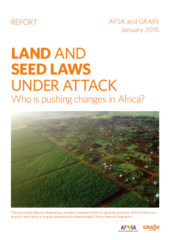
A battle is raging for control of resources in Africa – land, water, seeds, minerals, ores, forests, oil, renewable energy sources. Agriculture is one of the most important theatres of this battle. Governments, corporations, foundations and development agencies are pushing hard to commercialise and industrialise African farming.”
In their report “Land and seed laws under attack: who is pushing changes in Africa?”, the NGO GRAIN and the Alliance for Food Sovereignty in Africa (AFSA) maintain that the above mentioned actors are not only pouring money into projects to transform farming operations on the ground, but that they are also changing African laws to accommodate the agribusiness agenda. To substantiate their claim, they examine various initiatives such as the G8 New Alliance on Food Security and Nutrition, the US Millennium Challenge Corporation and the African Union Land Policy Initiative.
According to the authors’ analysis, most of today’s initiatives to address land laws, including those emanating from Africa, are overtly designed to accommodate, support and strengthen investments in land and large scale land deals, rather than to achieve equity or to recognise longstanding or historical community rights over land at a time of rising conflicts over land and land resources. What is also conspicuous is that most of the initiatives to change current land laws come from outside Africa.
When it comes to seed laws, the picture is reversed. Subregional African bodies – the Southern African Development Community (SADC), the Common Market for Eastern and Southern Africa (COMESA), the African Intellectual Property Organisation (OAPI) and others – are working to create new rules for the exchange and trade of seeds. But the recipes they are applying – seed marketing restrictions and plant variety protection schemes – are borrowed directly from the US and Europe.
The report is available in English, French, and Portuguese
Source : Rural 21
